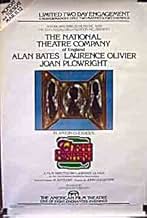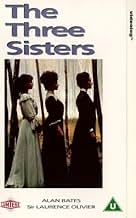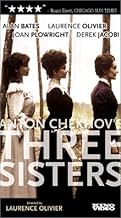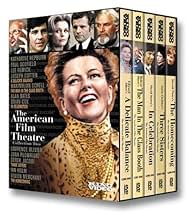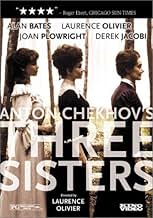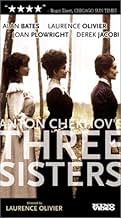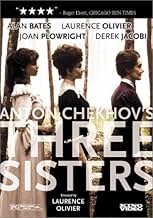Ajouter une intrigue dans votre langueNearly a thousand miles away from their beloved Moscow, Chekhov's Three Sisters live in virtual exile. Olga, a schoolmistress, attempts to support her siblings and the home that is the sole ... Tout lireNearly a thousand miles away from their beloved Moscow, Chekhov's Three Sisters live in virtual exile. Olga, a schoolmistress, attempts to support her siblings and the home that is the sole legacy of their late father.Nearly a thousand miles away from their beloved Moscow, Chekhov's Three Sisters live in virtual exile. Olga, a schoolmistress, attempts to support her siblings and the home that is the sole legacy of their late father.
- Réalisation
- Scénario
- Casting principal
Avis à la une
'Three Sisters' did have a good deal going for it. A big interest point being that it was directed by the legendary Laurence Olivier, and we already know that Olivier could adapt plays on film very well. Proven with for instance 'Hamlet', one of the best film versions of that play on film on its own merits. The cast promised a lot, the best known names being Alan Bates, Derek Jacobi and Joan Plowright. The play is one of Anton Chekhov's best, a masterclass of mood and character complexity.
Like with 'Luther', the previous film in the American Film Theatre series, my feelings on 'Three Sisters' were mixed to mildly positive. Loved most of the cast, with one person particularly standing out, and there are a number of fine qualities. Just found it too stagy and lacking in lustre. Do applaud Olivier for even attempting to adapt 'Three Sisters' for screen, Chekhov is one of the hardest playwrights to adapt and perform and 'Three Sisters' is one of the most difficult emotionally and in character writing. It just didn't quite come together as an overall whole.
A lot is done right. The cinematography is beautiful and atmospheric and actually did have a cinematic quality that was not present in the drama. William Walton's score is different from the rousing concert pieces of his and it captures the mood of the play very nicely without being too melodramatic. There are some moving moments, with the ending particularly having a staying power as ought. Chekhov's dialogue is amazing, his prose was met with a lot of scorn and criticism in his day but while wordy it has never been a problem with me.
It is full of emotion and thought-probing without being overwrought and typically fleshes out the complex characters with enough meat and not too much fat. The character complexity is nailed, thanks to the acting and Chekhov's prose, the character are not what one calls "likeable" but they are realistically flawed and psychologically fascinating. The performances do convey the key themes of loneliness and desperation very well and a vast majority of them nail their character traits and psychology. And it is the acting that saves 'Three Sisters', much of it exceptional. Was particularly mesmerised by Plowright and consider her performances one of the finest interpretations of any of Chekhov's female roles. Bates and Jacobi are outstanding too.
However, the stage origins show and often quite badly. While the cinematography opens up the action beautifully, Olivier's direction fails to do so. Much of it is too stagy, as well as too staid with no freshness or insight. Meaning that while the characterisation shines thanks to the performances the mood feels bland. The pathos for example doesn't resonate enough in my view.
Which is a big problem for an adaptation of Chekhov. There is one exception to the acting, Jeanne Watts was too histrionic for my tastes as Olga. With the over-deliberate pace and bland mood, 'Three Sisters' already long length feels longer. The sound is muffled at times.
Overall, was really taken with the performances (especially Plowright's) but there are far better representations of Chekhov around and it's not one of the best representations of Olivier either. 6/10.
Like with 'Luther', the previous film in the American Film Theatre series, my feelings on 'Three Sisters' were mixed to mildly positive. Loved most of the cast, with one person particularly standing out, and there are a number of fine qualities. Just found it too stagy and lacking in lustre. Do applaud Olivier for even attempting to adapt 'Three Sisters' for screen, Chekhov is one of the hardest playwrights to adapt and perform and 'Three Sisters' is one of the most difficult emotionally and in character writing. It just didn't quite come together as an overall whole.
A lot is done right. The cinematography is beautiful and atmospheric and actually did have a cinematic quality that was not present in the drama. William Walton's score is different from the rousing concert pieces of his and it captures the mood of the play very nicely without being too melodramatic. There are some moving moments, with the ending particularly having a staying power as ought. Chekhov's dialogue is amazing, his prose was met with a lot of scorn and criticism in his day but while wordy it has never been a problem with me.
It is full of emotion and thought-probing without being overwrought and typically fleshes out the complex characters with enough meat and not too much fat. The character complexity is nailed, thanks to the acting and Chekhov's prose, the character are not what one calls "likeable" but they are realistically flawed and psychologically fascinating. The performances do convey the key themes of loneliness and desperation very well and a vast majority of them nail their character traits and psychology. And it is the acting that saves 'Three Sisters', much of it exceptional. Was particularly mesmerised by Plowright and consider her performances one of the finest interpretations of any of Chekhov's female roles. Bates and Jacobi are outstanding too.
However, the stage origins show and often quite badly. While the cinematography opens up the action beautifully, Olivier's direction fails to do so. Much of it is too stagy, as well as too staid with no freshness or insight. Meaning that while the characterisation shines thanks to the performances the mood feels bland. The pathos for example doesn't resonate enough in my view.
Which is a big problem for an adaptation of Chekhov. There is one exception to the acting, Jeanne Watts was too histrionic for my tastes as Olga. With the over-deliberate pace and bland mood, 'Three Sisters' already long length feels longer. The sound is muffled at times.
Overall, was really taken with the performances (especially Plowright's) but there are far better representations of Chekhov around and it's not one of the best representations of Olivier either. 6/10.
Caught this on Talking Pictures and was really impressed. I have seen the play before on stage and think of it as a dreary piece, but this version has changed my opinion. It is the most naturalistic performanceI I have ever seen Laurence Olivier do. There is a lovely performance by Louise Purnell who I recently caught during lockdown when I dug out an old box set of Forsyte Saga. It was also interesting to see a very young Ronald Pickup and Derek Jacobi. I was most impressed. Additionally it was good to see the excellent Alan Bates who had replaced Robert Stephens who was ill. Some reviews mention poor sound but everything was clear and there were no problems,
It is remarkable how deeply interesting and moving is Chekhov's play about a small-town Russian family, longing to move to Moscow. Yet the playwright crafts with such affection and love for his characters that the viewer is hypnotized by the unfoldment.
With a production obviously based on a beautiful stage production, Laurence Olivier co-directs with John Sickel a most engrossing presentation.
Among the outstanding cast, Joan Plowright's Masha, Alan Bates' Col. Vershinin, and Olivier's Dr. Chebutikin are outstanding. The beautiful cinematography by Geoffrey Unsworth apparently utilize much of the stage sets, yet they merely add to the overall effectiveness.
Few cuts are made, as the production offers a comprehensive view of this work. Part of the American Film Theatre's series of 1970, "The Three Sisters" is a memorable experience. One longs for a re-release of this fine achievement.
With a production obviously based on a beautiful stage production, Laurence Olivier co-directs with John Sickel a most engrossing presentation.
Among the outstanding cast, Joan Plowright's Masha, Alan Bates' Col. Vershinin, and Olivier's Dr. Chebutikin are outstanding. The beautiful cinematography by Geoffrey Unsworth apparently utilize much of the stage sets, yet they merely add to the overall effectiveness.
Few cuts are made, as the production offers a comprehensive view of this work. Part of the American Film Theatre's series of 1970, "The Three Sisters" is a memorable experience. One longs for a re-release of this fine achievement.
Having a Russian background, I saw many productions of one of the most famous Chekhov's plays. I'd say the Olivier's "Three sisters" is the best of all I've ever seen. Even if there are some inaccuracies in details related to the Russian 19th century realities, the Olivier's n-depth understanding of the complicated Chekhov's work is amazing.
This fourth and final feature film directed by Laurence Olivier is his only one not based on Shakespeare or with himself in the title role. Itself now fifty years old, hence the startlingly youthful appearances of National Theatre alumni like Derek Jacobi and Sheila Reid as Andrei and his wife Natasha.
Described by Olivier as "a celebration of the acting rather than a thoroughly conceived filmic version of the play", the settings and groupings often resemble those of a German silent film while the costumes anticipate Bergman's 'Cries and Whispers'. Olivier's camera however glides about the set and cuts in lively pursuit of the Prosorov sisters as they dream their dreams of Moscow's bright lights.
Described by Olivier as "a celebration of the acting rather than a thoroughly conceived filmic version of the play", the settings and groupings often resemble those of a German silent film while the costumes anticipate Bergman's 'Cries and Whispers'. Olivier's camera however glides about the set and cuts in lively pursuit of the Prosorov sisters as they dream their dreams of Moscow's bright lights.
Le saviez-vous
- AnecdotesThis was one of two British made adaptations of Anton Chekhov's 1900 play "Three Sisters" released in 1970. The other was The Three Sisters (1970).
- Citations
Ferrapont the watchman: What are papers for, if not to be signed?
- ConnexionsFeatured in Nothing Like a Dame (2018)
Meilleurs choix
Connectez-vous pour évaluer et suivre la liste de favoris afin de recevoir des recommandations personnalisées
- How long is Three Sisters?Alimenté par Alexa
Détails
- Durée2 heures 45 minutes
- Mixage
- Rapport de forme
- 1.85 : 1
Contribuer à cette page
Suggérer une modification ou ajouter du contenu manquant

Lacune principale
By what name was Les trois soeurs (1970) officially released in India in English?
Répondre

